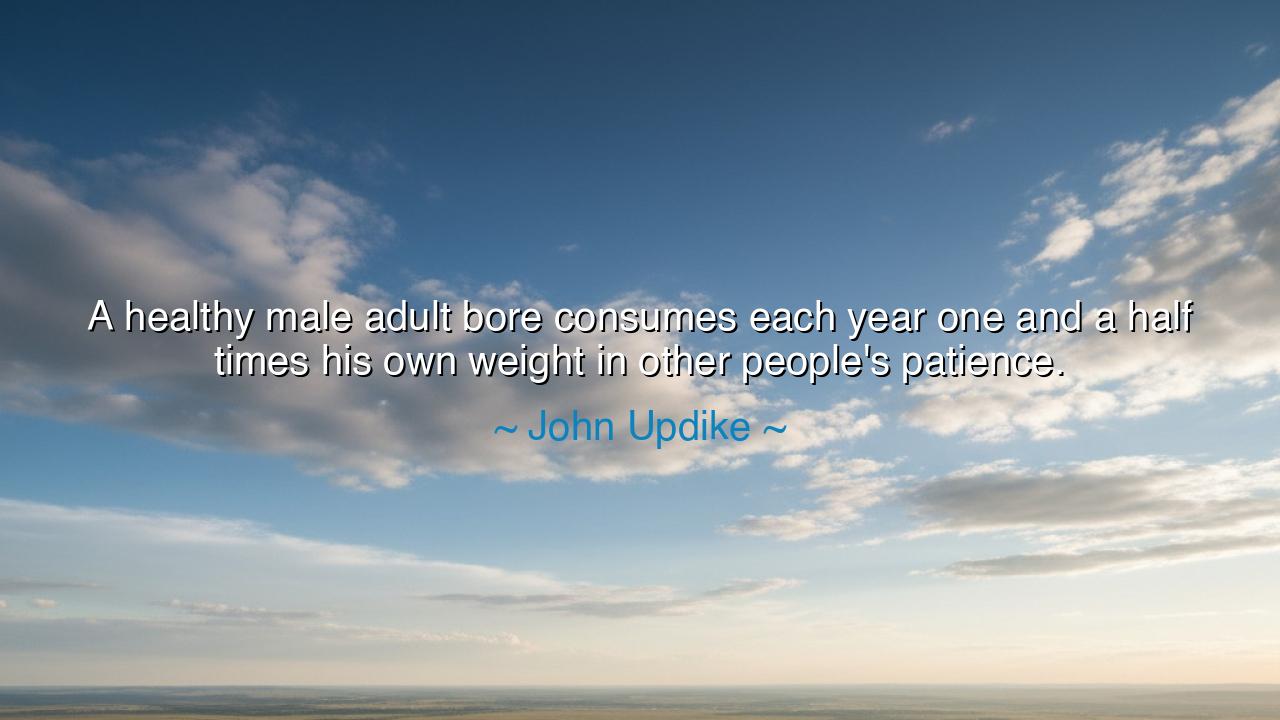
A healthy male adult bore consumes each year one and a half
A healthy male adult bore consumes each year one and a half times his own weight in other people's patience.






Hear now the words of John Updike, who with wit sharpened like a blade of irony, declared: “A healthy male adult bore consumes each year one and a half times his own weight in other people’s patience.” Though his tone was playful, beneath it lies a wisdom as keen as the proverbs of old. For what greater burden exists than to suffer the endless words and actions of one who drains the spirit, not through violence, but through monotony? The bore does not wound the body, yet he gnaws at the soul, feeding upon the forbearance of all who must endure his company.
The origin of these words is rooted in the simple observation of human gatherings, where men and women often must share time with those who care not for listening but only for speaking. The bore is the one who repeats what all already know, who insists on details none asked for, who holds the floor not to enlighten but to exhaust. Updike, master of social insight, measured their toll in terms of patience, that most fragile of virtues. He saw that while men may be weighed in flesh, the bore is weighed in the time and tolerance he consumes from others. Thus the metaphor becomes clear: to sustain his endless droning, he devours the very energy of those who cannot escape.
The ancients, too, knew this burden. Plutarch tells of men in the courts of Athens who spoke long past reason, pressing their cases not with wisdom but with sheer persistence. The assembly groaned, and though the speaker left satisfied, the listeners left weary. In this, the bore reveals his true power—not in persuasion, but in the slow erosion of others’ strength. It is as though he were a parasite, living not by his own vitality but by the consumption of another’s patience.
Consider a story from the life of Samuel Johnson, the great English lexicographer. He was once asked why he often avoided certain men of society, though they were harmless. His reply was that their conversation cost him too much—too much attention, too much energy, too much restraint. Better, he said, to keep company with those whose words nourish, not deplete. Here we see the wisdom of Updike’s metaphor: the bore is not dangerous in the way of a thief or enemy, yet he is costly in a subtler currency—the time and endurance of those around him.
But let us not mistake Updike’s wit as mere mockery. His words carry also a lesson for self-reflection. For who among us has not, at some moment, been the bore? Who has not spoken too long, repeated too much, pressed a story that drew not delight but sighs? The quote thus becomes a mirror, reminding us to measure our speech, to be attentive to the weariness or joy of our listeners. To consume the patience of others without heed is to tread a selfish path. To give back with brevity, wit, or care is to show respect for the souls around us.
The meaning, then, is twofold: beware the bore, and beware of becoming one. To suffer him requires strength of tolerance; to be him requires blindness to others’ needs. Both are pitfalls in the art of living well. For the wise man not only values his own time but honors the time of others, offering speech that enlightens, shortens burdens, or brings laughter, rather than draining the fragile store of patience.
Therefore, let your actions be thus: in company, speak with purpose, listen with attentiveness, and remember always that silence can be more nourishing than endless noise. Avoid the vanity of believing all your thoughts must be shared, and seek instead the grace of knowing when to yield the floor. And when faced with the bore, arm yourself with gentleness, but also with the courage to turn the stream of conversation to fresher waters. For in guarding the patience of yourself and others, you preserve the harmony of human fellowship—and keep your gatherings from becoming feasts upon the soul.






AAdministratorAdministrator
Welcome, honored guests. Please leave a comment, we will respond soon